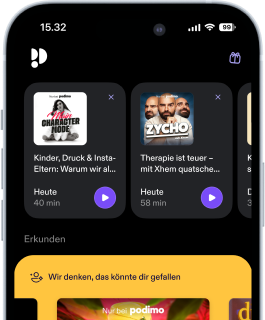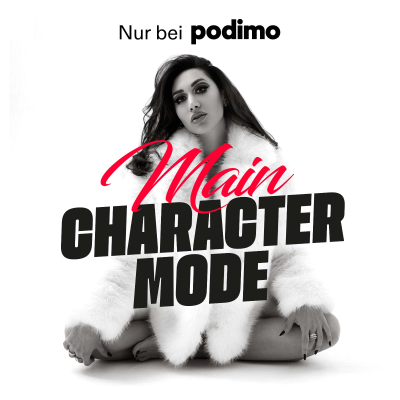
Companial Podcast
Podcast von Companial
Nimm diesen Podcast mit

Mehr als 1 Million Hörer*innen
Du wirst Podimo lieben und damit bist du nicht allein
Mit 4,7 Sternen im App Store bewertet
Alle Folgen
11 FolgenIn this Podcast series, Power Platform expert Chris Parkes, in association with QBS Group, covers an overview of the component parts of the technology at a high level. Power Automate is a component part of the Microsoft Power Platform. As with all things Power Platform, there’s more than one type of automation that it can provide to deliver business results. There are four specific things that partners need to be aware of, Power Automate for desktop, Power Automate for web, Power Automate for mobile and Power Automate for Microsoft Teams. Listen in to this bitesize, ten minute episode to learn more about how each of these can enable something slightly different based on the needs of the business or the end user from simple workflow automation through to fully fledged Robotic Process Automation (RPA,) where we ask three key questions: * “What is it?” * “Why should I care about it?” * “How can I make money from it?” Targeted specifically at Microsoft partners looking to go to market with a Power Platform proposition, other topics such as example use cases, associated costs, key licensing considerations and the skills required to get started and be successful with Power Platform will be covered. For more information: Dynamics 365 & Power Platform – Special Interest Group | QBS group [https://www.qbsgroup.com/event/dynamics-365-power-platform-special-interest-group/]
When we covered Power Platform in the first episode of this series, you mentioned that Power Apps were a component part of the Power Platform, and that they could be used to build and deploy customized applications. CP: Indeed I did and yes, they can. I talked specifically about the iPhone and how the expression “there’s an app for that” entered our everyday language when it comes to mobile devices and then, how the Power Platform or Power Apps in particular, really brings to the fore the expression “there's a business app for that” right now. UK: OK, so when it comes to these apps, or “applications,” what does Power Apps provide that means a partner should start to take notice and get to know more about what they are? CP: Yes, so Power Apps provides today what is known as a “low code” developer environment that can be used to build custom applications or “apps” for business needs. There are different types of Power Apps including Canvas Apps and Model Driven Apps as well as other things branded under the same product family. Both Model Driven and Canvas apps sit nicely on top of the Microsoft Dataverse, but there are also hundreds of pre-built connectors that can be used to consume data from, or push data to, other systems. UK: Right Chris so, when you say other things branded under the same product family, what exactly do you mean? CP: Yes, of course. So, Microsoft acquired a company called Adxstudio back in 2015 primarily to strengthen their web self-service product portfolio and there’s a product now known as Power Apps Portals which is the modern-day equivalent of Adxstudio Web portals. The original product was built by the Microsoft ISV partner natively on top of what was Dynamics CRM. It became Dynamics 365 Portals and then more recently Power Apps Portals. UK: OK, so that’s the history of that product, but what do these Power Apps Portals actually provide? CP: Well, although they’ve been rebranded and have technically evolved over time, the concept of these portals hasn’t changed. In general, they provide a way to give access to data, anonymously if required or, through secure sign in to protected information stored within an organisation. So, to give you an example here, if you were a membership organisation and you wanted to provide a website for people browsing to access anonymously to encourage them to consider joining, you could use Power Apps portals to do that. And then, for any members that had already joined, you could also use it to provide secure access to additional content repositories or personalised member areas. UK: Right, that is clear. Then also Chris, what is the difference between a Canvas App and a Model Driven App? You have mentioned both, can you help me understand why they are different? CP: Yes, I can of course. So, model driven apps are designed and built on top of the Dataverse. Microsoft’s own first party apps such as Dynamics 365 for Sales or Customer Service are examples of Model Driven apps in their own right. And, one of the things that Power Apps provides is the ability for anyone to create a model driven app that can leverage the same user interface as those first party applications. You can also use the same capabilities to enforce business logic and then publish apps easily for consumption in a way that is almost identical to how those first party apps are published. Usually, you would start the creation of those apps with a structured data model in mind, hence, “model driven” apps. Canvas Apps start from the opposite end of the design thinking. They provide a blank canvas, onto which you can drag and drop pre-built controls, and then use Excel like expressions known as Power Fx to define logic and work with data. You can share them natively or embed them so that they can be consumed from other places such as Teams, SharePoint or Power BI.
Microsoft Dataverse is part of the Power Platform and it was a common data model and is also the database that the majority of the core Dynamics 365 Business Applications live on. In this episode of the ‘Powerplatform explained’ Podcast series we want to clarify what exactly he Dataverse is, why a partner should care and how he can make money from it. Visit QBS Power Platform Interest Group [https://www.qbsgroup.com/event/dynamics-365-power-platform-special-interest-group/] Microsoft have provided the ability to integrate with Dataverse through providing configuration capabilities in Business Central. So, you can do single or bi-directional synchronisation of Accounts, that’s Customers and Suppliers or Vendors in Business Central terms, Contacts, Currency and Salespeople/Purchasers with the Dataverse. Also, if you or your customer is using Dynamics 365 for Sales then additional data synchronisation can be enabled for Products from Items and Resources, Price Lists, Opportunities, Sales Orders, Sales Invoices, lots of out of the box capabilities can be configured. And it doesn’t stop there, if you wanted to write your own custom connectors to hook Business Central into Power Automate to drive workflows, or even use the Microsoft provided Business Central connectors, those capabilities are also possible options for you to consider on a scenario-by-scenario basis. Then, the other option you could consider building for integrations is around virtual tables. These are tables that exist in Business Central but do not synchronise to, nor do they then reside in Dataverse. Virtual tables can be made available to Microsoft Dataverse, but they need to be accessed via development of custom APIs or through the standard Business Central APIs. Dataverse is something that is difficult to position and sell on its own, no one goes out to market with a “Would you like some of this new data platform?” messaging, it just doesn’t resonate with customers. So, you need to consider the capabilities it provides and then combine them with other parts of the Power Platform. Do you want to define a proposition around extending the existing core entities such as Accounts and Contacts to provide new solutions in market for your customers? Do you want to go and build new tables that can help with additional data capture and storage needs for your customers? When those things are combined with the power of the Unified Interface in model driven Power Apps or new workflow integration solutions through Power Automate then you can begin to uncover net new opportunities in your customers that you maybe hadn’t considered before. Finally, don’t forget about the potential of Power BI in the equation here too, the ability to deliver dashboard style KPIs on top of the data that you help your customers capture then analyse and act upon. All of these things bring annuity licence revenue opportunities with the usual expected margins and extended consulting and services opportunities for continual, ongoing development for customers as their needs change and evolve over time. As we have said before, there’re a lot of ways in which partners can look to begin to make money from the Microsoft Power Platform, the key is for each of them to come up with their own ideas and then turn them into products, solutions or services to suit their own market and customer requirements.
In this Podcast Series the QBS Power Platform Expert Chris Parkes covers the technology at a high level, what is Power Platform, Dataverse, Power Apps, Power Automate and Power BI. Furthermore, he shows use cases, talks about costs, licensing and how you can get ready for Power Platform, what’s in for partners and customers and much more. More information: Dynamics 365 & Power Platform – Special Interest Group | QBS group [https://www.qbsgroup.com/event/dynamics-365-power-platform-special-interest-group/]
In dit interview zal Bert Siekmann [https://www.linkedin.com/in/bertsiekmann/?originalSubdomain=nl] en Martin Plaat [https://www.linkedin.com/in/martin-plaat-19b555/?originalSubdomain=nl], directeur van SucceedIT [https://www.succeedit.nl/] en Partner of the Year [https://www.qbsgroup.com/nl/partner-of-the-year/] van QBS Group, u meer vertellen over de kern van het succes van SucceedIT. SucceedIT is gespecialiseerd in de ERP oplossingen van Microsoft en richt zich met name op de ondernemingen in de (groot)handel. Hun succes is mede bepaald doordat ze zoveel mogelijk gebruik maken van bestaande standaardoplossingen en zich zo min mogelijk richten op maatwerk. Een van de belangrijkste voordelen is dat de druk op de supportafdeling significant minder wordt. > “Dankzij onze focus op de standaarden is de druk op onze support significant lager. Zo kunnen we een belangrijke focus houden op onze klantrelaties en contacten.” Martin Plaat – SucceedIT Bent u een ICT-partner en bent u geïnteresseerd in het partner eco-systeem van Microsoft, dan is deze podcast interessant om te beluisteren. Ontdek hier het succes van de nieuwste generatie Microsoft Business partners.























